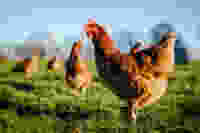
The Government must reconsider its downgrade of poultry transport legislation
This month it is now a year since the UK Government was elected and 203 years since the world's first ever animal welfare law. The Government has yet to set out its animal welfare strategy, expected in the autumn, but the RSPCA is disheartened to see that the first law passed on farmed animal welfare is actually a step backwards. On 22 July a new law was rapidly passed to change animal transport legislation to downgrade UK standards and allow two leg catching and carrying of certain types of poultry.
Why is this so important? Firstly, from an animal welfare perspective, we know that carrying poultry in an upright position with their weight properly supported underneath is better for their welfare. The Government’s own scientists said as much to Defra in an Animal Welfare Committee report published last year. Catching and carrying poultry by their legs causes breathing difficulties due to the weight of the birds’ organs on their lungs and higher risk of injuries such as fractures or dislocations, as well as greater handling stress. In addition, carrying birds upside down can also cause immobility before they are placed into containers for onward transportation which may be a result of fear.
Secondly, this is the first animal welfare measure passed under this UK Government and for a Government that has said it will bring in the biggest boost for animal welfare in a generation, it is a clear step backwards. Legal protection for farmed animals is already woefully inadequate and enforcement of that protection is virtually non-existent. So it's critical that we progress our farmed animal welfare standards but this move weakens the existing 20-year-old legislation on the catching of poultry. Whilst the UK positions itself as a leader on animal welfare and makes promises to maintain our higher welfare standards in free trade agreements with global nations, such an unnecessary downgrade of our standards feels completely at odds with this mission.
Despite the legislation attracting criticism from a House of Lords Select Committee, the majority of consultation responses opposing it, more than 10 MPs signing a petition to stop it - and with the Courts due to hear a Judicial Review of the way the Government have gone about this, still the Government has been deaf to all criticism.

I will acknowledge that previous measures were not enforced or widely understood. There was great confusion in the industry on what was actually permitted but instead of seeing this as an opportunity to improve, the Government has legitimised a method which we know is worse for bird welfare. For some time, the RSPCA welfare standards have stated that catching poultry in an upright position is our preferred method and we have advised against double leg catching. However, we have not prohibited it because, even more confusingly, it has been listed in Defra’s own welfare codes of practice as an acceptable method. We would like to see this phased out in favour of humane, alternative methods and we want to see the Government acting on this as soon as possible and working with the industry to help with this transition.
It’s highly possible that catching poultry individually in an upright position will mean the process will take longer and more catchers will be needed to mitigate this stress for both the workers involved and the birds themselves. Research also suggests it would cost £0.003 per egg to move to upright catching, however, even during a cost of living crisis our research suggests that most consumers are happy to pay a little bit more to ensure higher welfare.
The UK Government has set a five-year timetable to undertake research into alternatives to double leg catching, but we believe this is far too long. A phase-out period would additionally be required which could mean the welfare of poultry will continue to be compromised for at least the next decade. Whilst Government grants already exist to help improve animal welfare, we recognise the financial implications of this change and would urge the Government to look at increasing funding available to help farmers make this transition and for the UK Government to produce a detailed phase-out plan that supports both animal welfare and the industry.
To further support industry during planned research and transition phases, farm assurance scheme, RSPCA Assured, will work with its poultry and catching members to identify practical and commercially viable methods for implementing upright catching, providing guidance and support throughout the process.
More needs to be done and quickly to ensure we’re protecting bird welfare and supporting farmers to achieve higher welfare standards in order to reach our shared goal of having a more compassionate and sustainable food system for all. The RSPCA hopes that this Government will bring about the most improvements for animal welfare in a generation but you don't start a long journey by taking a step backwards.

David Bowles is head of RSPCA’s public affairs and campaigns and is a board member of the Association of Cat and Dog Homes and the World Federation for Animals.














